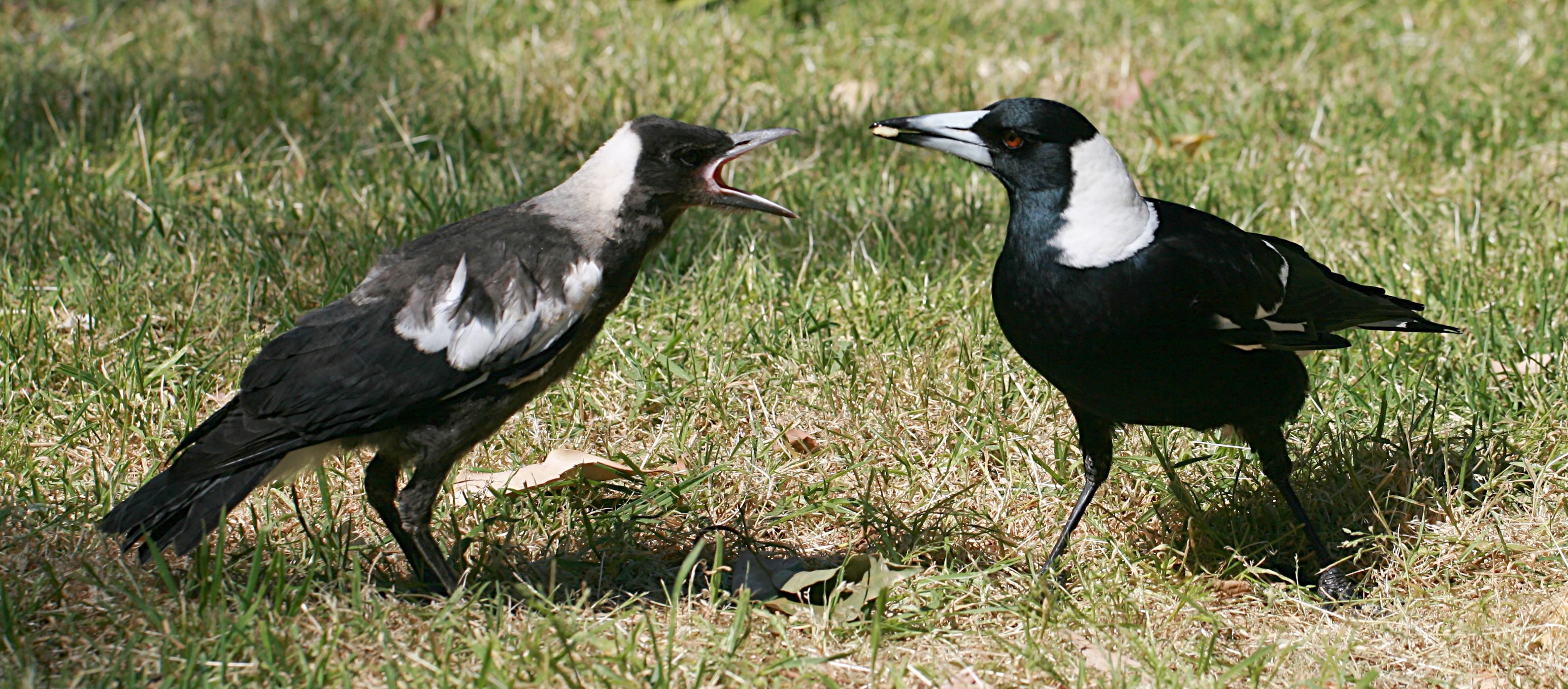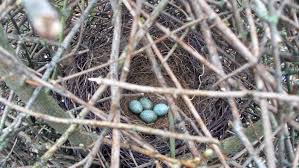You’re a bird: Does your personality depend on when you hatch?
September 12, 2014

Sibling competition can be found throughout the animal kingdom --- not just in humans. An animal may share half of their genetic material with their siblings, but they still compete for the same limited resources, especially parental care and food. In this context, being born first may confer certain benefits, such as a larger size; but being a later-born may come with other benefits, either personality or physiological traits to level the playing field. A recent study from Finland, “Sex-specific differences in offspring personalities across the laying order in magpies Pica pica” examines this "birth order" effect in one of my favorite corvid species, the magpie. But first, let’s look a little deeper at the complicated world of bird parenting and sibling rivalry.
Sibling competition is particularly intense in many bird species, such as seabirds, eagles and other predatory birds. It might seem that compared to carrying your offspring around for extended periods as most mammals do, laying an egg is a low-investment style of parenting, and perhaps there wouldn’t be much of a need for competition between nestlings. But many studies suggest that the reproductive and offspring-rearing behaviors of birds are a lot more complicated than they look, even if they are not in the wild and living in big bird cages!
[caption id="attachment\\_11860" align="alignright" width="318"][](http://berkeleysciencereview.com/wp-content/uploads/2014/09/Variegated\_Fairywrens\_Dayboro\_1207.jpg) Fairy wrens teach their offspring a "password." Photo by Aviceda via Creative Commons.[/caption]
When it comes to parenting, recent research suggests that superb fairy wrens sing to their eggs, passing on a special call that the nestlings repeat once hatched. Fairy wrens are subject to brood parasitism by cuckoo birds, where the cuckoos lay eggs in the wren's nest. When the cuckoo hatches, it will often push wren eggs out of the nest, killing the birds before they hatch.
For the wrens lucky enough to hatch, they now have to compete with the cuckoo for food. Without mechanisms for identifying one’s own hatchlings, wrens may invest a lot of time and energy raising birds she’s not even related to. By providing her babies with this “password,” mama can prioritize which hatchlings to feed.
Sometimes parents can’t even protect their offspring from their own siblings, much less other birds. In some predatory birds, obligate siblicide is common – once the youngest birds are hatched, their elder siblings start pecking them, often to death. Reproducing birds may lay more eggs than they can hatch as insurance, in case that first hatched egg is infertile; that risk may pay off if food is flush, no siblicide occurs, and all baby birds survive (although in most cases, they do not).
Even if eldest-hatched birds don’t kill their younger sisters and brothers, birds still fight and compete. So how do those later-hatched birds survive? Turns out nature has provided some other mechanisms for keeping up with those bullying kin. These biological mechanisms are also reflected in differing personality or temperament traits related to birth order.
[caption id="attachment\\_11861" align="alignleft" width="260"][](http://berkeleysciencereview.com/wp-content/uploads/2014/09/magpie-nest.jpg) Magpie nest. Whichever egg hatches first, that bird may have some natural advantages in competing for resources! Photo by nottsexminer via Creative Commons.[/caption]
One way that mother birds can provide some advantages to those later laid and hatched eggs is through increased steroid (androgen) levels. And that’s exactly what happens in the magpie. The authors of the Finnish study found that the last-hatched chicks had higher testosterone levels than the earlier hatched. These varying hormone levels are likely expressed behaviorally via personality traits, as younger birds tend to be more vocal and pugnacious, increasing their chances to fight for access to food.
In fact, researchers did find personality differences based on “birth” order. To study this, they visited nests daily, tracking the arrival of new eggs and the hatching of baby magpies. Researchers took a first-born and late-born nesting from each nest, and kept them in naturalistic outdoor aviaries. When the chicks were four months old, they were run through a battery of tests: how quickly they would explore a new arena, and how they interacted with a novel object (a toy truck). They also measured general activity levels.
Results suggested that the early hatched females were more explorative in both the novel environment and when interacting with the object, while later born males were the more adventurous ones in the arena (although hatching order did not influence interactions with the object for male magpies). In general, being hatched early made female magpies less active, with the opposite effect in males. This sex effect could be a result of hormones acting differently on males than females, although the authors did not delve into the possible benefits of this sex difference.
[caption id="attachment\\_11870" align="alignright" width="212"][](http://berkeleysciencereview.com/wp-content/uploads/2014/09/FrankSullowayTortoise-SU-2002-277-6Moffett-editedsharpened-small.jpg) UC Berkeley's own Frank Sulloway is an expert on birth order and personality.[/caption]
UC Berkeley’s own Frank Sulloway, Adjunct Professor of the Psychology Department, knows a thing or two about personality and birth order. While much of his research has focused on the ecological changes in the Galapagos and the evolution of Darwin’s Finches, he has researched and written extensively on how birth order influences personality traits (his recent study on the differences in risk-taking in siblings in Major League baseball, finding that younger siblings steal more bases than their older brothers, received a lot of media attention; side note: Dr. Sulloway is also a co-author on that fairy-wren password study!).
I asked Dr. Sulloway what he thought of the sex difference that the authors of the current study found. He suggested that “for younger male offspring, risk taking (in the form of being more active and adventurous) would pay off as long as their probability of mating is lower than that for older siblings, which generally should be the case. For females who are likely to mate and produce offspring regardless of their condition, exploration ought largely to depend on condition rather than potential for mating success. Hence healthier females chicks would be expected to have more energy for exploration than their younger siblings.”
So next time you get mad at one of your siblings, be thankful that humans don’t show obligate siblicide; but you might want to think about whether where in the birth order you fall has had other impacts on your life and personality! And when you see a bird, give a little thought to just how complex their lives may be back in the nest and behind the scenes!
Selected References:
Colombelli-Négrel, D., Hauber, M.E., Robertson, J., Sulloway, F.J., Hoi, H., Griggio, M., & Kleindorfer, S. (2012). Embryonic learning of vocal passwords in superb fairy-wrens reveals intruder cuckoo nestlings. Current Biology, 22: 2155-2160.
Rokka, K., Pihlaja, M., Siitari, H., & Soulsbury, C. D. (2014). Sex-specific differences in offspring personalities across the laying order in magpies Pica pica. Behavioural Processes, 107: 79-87.
Sulloway, Frank. (2007). "Birth order and sibling competition." Handbook of Evolutionary Psychology, edited by Robin Dunbar and Louise Barrett (Oxford: Oxford University Press), pp. 297-311.
Sulloway, Frank. (2010). "Why siblings are like Darwin's Finches: Birth order, sibling competition, and adaptive divergence within the family." In The Evolution of Personality and Individual Differences, edited by David M. Buss and Patricia H. Hawley (Oxford: Oxford University Press), pp. 86-119.



